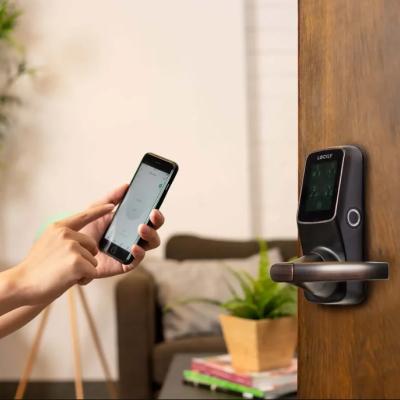Find Reliable Home Service Pros
Start your project today
Free consultations with no obligation.
How Remodel.one works
Tell us about your project
Answer a few easy questions to get matched with the best local pros.
Receive quote
Shortly thereafter you will receive a quote from a trusted contractor in your area.
Get the job done
Don't disrupt your life. Installation usually only takes 1 single day.


 Home Security Systems
Home Security Systems
A home security system provides peace of mind along with protection for your loved ones and belongings. Despite the fact that property crime has decreased by more than 6% for the seventeenth year in a row, according to the FBI, it is still a natural instinct to defend what we value. As a center for home automation systems, today's home security systems bring convenience and energy savings while also lowering costs.We'll cover each sort of alarm system in our guide to home security systems so you can choose which is ideal for your property.
 1. Burglar Alarms
1. Burglar Alarms
An essential part of home security are intrusion detection systems, commonly referred to as burglar alarms. These systems are made to recognize when someone enters a home without authorization and sound an alarm. Motion detectors, control panels, and sensors for windows and doors are just a few of the features that contemporary burglar alarms include. Incorporating smart home technologies and remote monitoring are additional features of certain sophisticated systems.
 2. Smoke detectors and fire alarms.
2. Smoke detectors and fire alarms.
A complete home security system contains smoke detectors and fire alarms to guard against fire threats in addition to burglary prevention. In the case of a fire, smoke detectors can promptly identify the presence of smoke and provide early warnings. In addition to being able to be connected with monitoring systems to provide remote alerts, fire alarms are crucial for alerting residents and emergency personnel.
 3. Video Surveillance
3. Video Surveillance
As a way to monitor property and discourage break-ins, video surveillance has grown in popularity. High definition video recording, night vision, and remote computer or smartphone access are all features of contemporary security camera systems. In the event of an incident, video monitoring not
 How to Choose a Security System?
How to Choose a Security System?
Selecting the best home security system requires thorough evaluation of a number of variables in order to satisfy each homeowner's unique requirements and preferences. The following is a guide to selecting a reliable security system:
- Evaluate the vulnerabilities at home: Determine any places that might be vulnerable to fire threats as well as possible access points for criminals. Think about how the property is laid up and if any areas need extra security monitoring.
- Specify your security goals: Clearly state the main objectives of the security system, including monitoring general property activity, detecting fires, and preventing burglaries.
Considering the Budget:
Create a security system budget that accounts for both the system's initial installation expenses and any recurring monitoring fees. To identify the system that offers the best value, weigh the required features against the available spending limit.
DIY vs. Professional Installation:
Choose between installing your system professionally and doing it yourself (DIY). While DIY solutions offer flexibility and cost savings, professional installation guarantees appropriate setup and integration.
Observation Services:
Examine the many monitoring services that are accessible to offer quick alert response and round-the-clock observation. Recognize all conditions and expenses related to monitoring services, including any obligations imposed by contracts.Combining Smart Home Appliances:
If homeowners already own smart home appliances, be sure the security system they select can work in unison with them. Integration makes it possible to automate and handle many household tasks from one single location.
 Find out what customers have to say about research:
Find out what customers have to say about research:
Examine user feedback and endorsements for various security systems to determine system dependability and user satisfaction.
Seek input regarding the system's usability, customer service, and efficacy in practical situations.
Scalability:
Think about how scalable the security system is. Long-term value comes from a system that can expand to accommodate new properties and evolving security requirements.Guarantee and Assistance:
- Examine the security system provider's warranty. A comprehensive warranty is an indication of the manufacturer's faith in the dependability of the system.
- Examine customer service alternatives and timeliness in the event that problems arise or troubleshooting is required.



Home Security Systems
Having a home security system is vital in today’s world, where burglaries occur every 26 seconds and millions of Americans find themselves a victim of one of the most common threats to a home. Contrary to popular belief, crime in the U.S. is on the decline in recent years, but this doesn’t mean you should be ignoring the risk of theft and damage to your home. Installing a home security system is one of the most effective methods to deter thieves and protect your family and belongings.
Related Articles
homesecurity
DIY Home Security: Budget-Friendly Ways to Stay SafeProtect your home on a budget! Simple DIY security tips to keep i...
homesecurity
Are Smart Locks Really Secure? Experts Weigh InSmart locks offer convenience, but are they truly secure? Experts...
homesecurity
CCTV Upkeep and Care: Guaranteeing the Dependability and Efficiency of Monitoring SystemsGuardians of Surveillance: The Art of CCTV Maintenance and Care f...
homesecurity
What to Look for in an Outdoor Security System?We have you covered if you are worried about the safety of your h...
homesecurity
How to Reduce Costs Through Home AutomationConvenience is only one benefit of home automation. Currently, in...
homesecurity
5 Money-Saving Energy-Efficient Home ImprovementsMany seemingly expensive home improvement projects can actually s...












